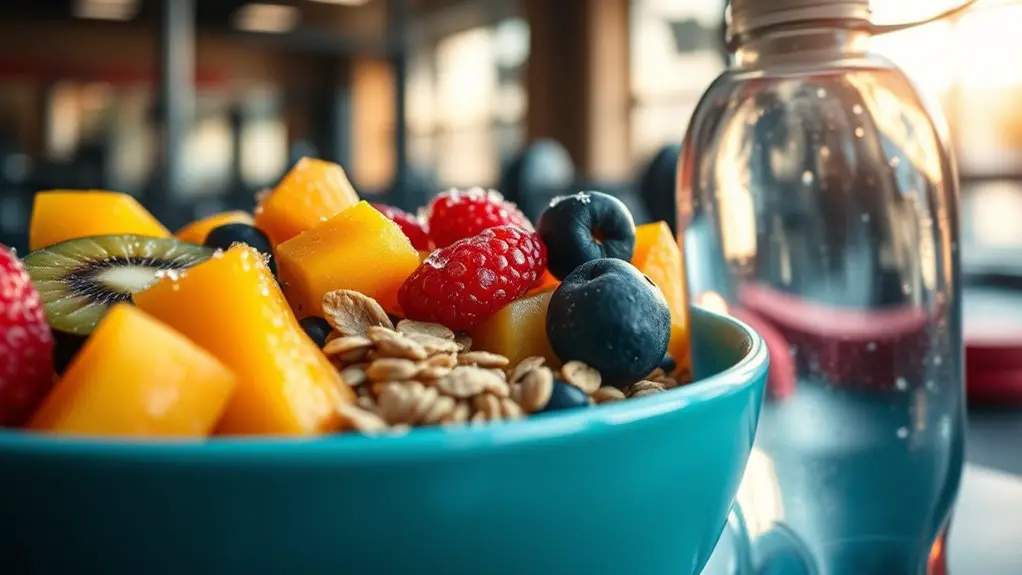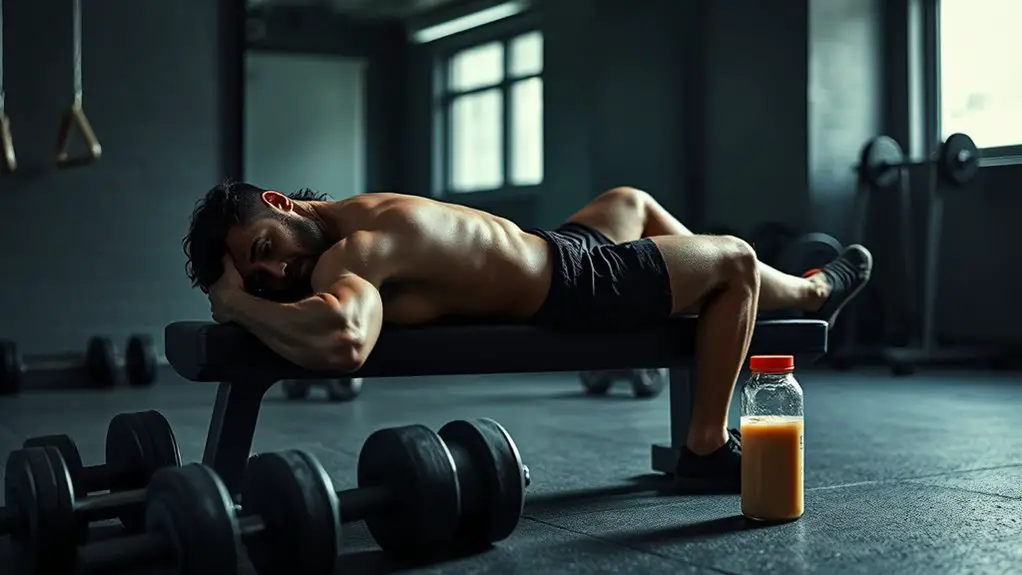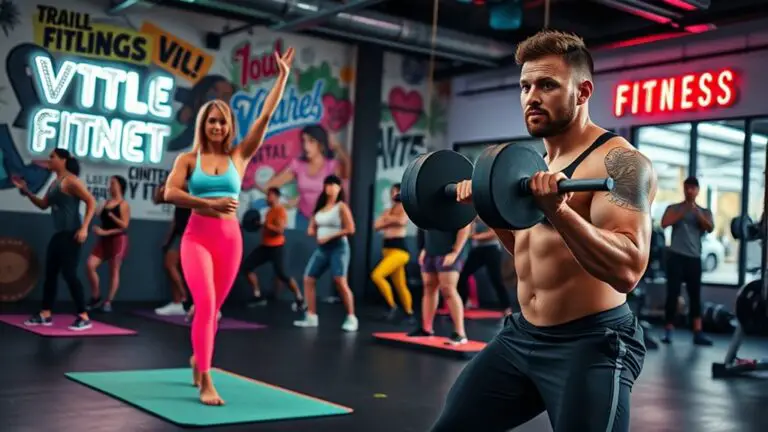What Happens If You Don’t Eat After a Workout?

If you don’t eat after a workout, your recovery takes a hit. You risk muscle loss and increased fatigue since your body needs protein for muscle repair and carbs for glycogen replenishment. Without proper nutrition, you may experience hormonal imbalances that can affect your mood and energy levels. Plus, it can slow your metabolism, making it harder to achieve your fitness goals. There’s more to understand about the long-term effects, so keep going!
The Importance of Post-Workout Nutrition

When you finish a workout, your body is primed for recovery, making post-workout nutrition essential. It’s important to refuel with the right nutrients to support your fitness goals and overall health. Timing matters; aim to eat within 30 to 60 minutes after exercising. This window is when your muscles are most receptive to nutrients.
Incorporating quality protein sources, such as lean meats, dairy, or plant-based options, helps repair and build muscle. These proteins provide the amino acids your body needs to recover effectively. Don’t forget about carbohydrates, too; they replenish glycogen stores depleted during your workout.
Muscle Recovery and Repair
After a workout, your muscles need the right nutrients to recover and grow. If you skip eating, you might miss out on the vital timing that helps with muscle repair. The impact on your muscle growth can be significant, so it is important to refuel properly.
Importance of Nutrient Timing
Although many people underestimate its significance, nutrient timing plays a crucial role in muscle recovery and repair following a workout. Properly fueling your body after exercise helps optimize workout recovery, ensuring your muscles get what they need to heal and grow stronger.
To enhance your recovery, focus on:
- Protein intake to support muscle repair.
- Carbohydrates to replenish glycogen stores.
- Hydration to maintain fluid balance and aid recovery.
- Timing by eating within 30-60 minutes post-workout.
Impact on Muscle Growth
Failing to eat after a workout can greatly hinder your muscle growth, as your body relies on the nutrients consumed during the post-exercise window to repair and build muscle tissue. After exercising, your muscles need amino acids to kickstart protein synthesis, which is essential for recovery. Without adequate nutrition, this process is impaired, leading to slower recovery and less effective muscle repair. You might not see the gains you’re working hard for, and your muscles could even start to break down. To support your muscle growth, aim for a balanced post-workout meal that includes protein and carbohydrates. This guarantees your body has the necessary ingredients to repair and grow stronger, enhancing your overall fitness journey while keeping you safe.
Glycogen Replenishment

When you finish a workout, your muscles are primed to replenish glycogen stores, which are essential for your energy levels. Not eating after exercise can hinder this process, negatively impacting your energy balance. It’s vital to refuel your body to maintain peak performance. Here’s what you should consider:
Refueling after a workout is crucial for restoring glycogen levels and maintaining energy balance for optimal performance.
- Timing: Eat within 30 minutes post-workout for maximum glycogen replenishment.
- Carbohydrates: Focus on complex carbs to efficiently restore glycogen stores.
- Protein: Include protein to support muscle recovery and enhance glycogen synthesis.
- Hydration: Don’t forget to rehydrate; fluids aid in the replenishment process.
Impact on Metabolism
If you skip a post-workout meal, you might disrupt your metabolism in more ways than one. Proper nutrition helps maintain energy balance and supports your body’s recovery process. When you don’t eat after exercising, you risk metabolic adaptation, where your body starts to conserve energy, making it harder to lose weight or gain muscle over time.
Here’s a quick look at the potential impacts:
| Impact | Description | Result |
|---|---|---|
| Slowed Metabolism | Less energy expenditure | Weight gain risk |
| Increased Hunger | Cravings due to energy deficit | Overeating later |
| Hormonal Imbalance | Disruption in hunger hormones | Increased appetite |
| Muscle Recovery Delay | Slower repair processes | Longer recovery time |
| Fatigue | Poor energy levels post-exercise | Decreased performance |
To keep your metabolism functioning efficiently, make sure to refuel after your workouts!
Loss of Muscle Mass

If you skip eating after a workout, you might be hindering your muscle repair process. This lack of nutrients can lead to increased protein breakdown, making it harder for your muscles to recover. Over time, this could contribute to noticeable muscle loss.
Muscle Repair Impairment
Failing to eat after a workout can considerably hinder your muscle repair processes, leading to potential loss of muscle mass. When you skip post-workout nutrition, you might experience:
- Increased muscle soreness
- Prolonged recovery timeline
- Diminished strength gains
- Higher risk of injury
Your muscles need protein and carbohydrates to aid recovery and rebuild properly. Without these nutrients, you’re not only delaying your recovery but also risking the very progress you’ve worked hard for. It’s essential to refuel your body to support muscle repair, enhance performance, and guarantee overall safety in your fitness journey. Prioritizing post-workout nutrition can help you avoid setbacks and stay on track toward your fitness goals. Don’t underestimate the importance of what you eat after exercising!
Increased Protein Breakdown
Neglecting post-workout nutrition can lead to increased protein breakdown, which ultimately contributes to a loss of muscle mass. When you skip a meal after exercising, your body’s ability to perform protein synthesis diminishes, hampering workout recovery. This can set off a chain reaction, where your muscles start breaking down instead of rebuilding.
| Effects of Not Eating | Importance of Post-Workout Nutrition |
|---|---|
| Increased protein breakdown | Supports muscle recovery and growth |
| Decreased muscle mass | Preserves strength and endurance |
| Slower recovery time | Enhances performance for future workouts |
To maintain muscle integrity, prioritize proper nutrition after your workouts. Your body needs the right nutrients to rebuild and recover effectively.
Increased Hunger and Cravings
When you skip a post-workout meal, your body often responds with increased hunger and cravings, making it harder to stick to your nutrition goals. Ignoring those hunger signals can lead to overeating later, which might derail your progress. To manage cravings effectively, consider these strategies:
- Stay Hydrated: Sometimes thirst is mistaken for hunger, so drink water.
- Balance Macronutrients: Include protein, healthy fats, and carbs in your meals to stay satisfied longer.
- Plan Your Meals: Having a post-workout meal ready can help you avoid impulsive food choices.
- Mindful Eating: Pay attention to your body’s signals and eat slowly to recognize fullness.
Energy Levels and Fatigue
If you don’t refuel after a workout, you might find your energy levels plummet, leaving you feeling fatigued and sluggish. This energy depletion can hinder your ability to perform daily tasks and impact your overall mood. When your body doesn’t get the nutrients it needs, it struggles to recover, leading to prolonged fatigue that can affect your motivation to exercise in the future.
Effective fatigue management is essential for maintaining your performance and energy throughout the day. Eating a balanced meal or snack post-workout helps replenish glycogen stores and supports muscle recovery. By prioritizing nutrition, you’re not just preventing fatigue; you’re also empowering your body to recover efficiently.
Immune System Function
Failing to eat after a workout can compromise your immune system, making you more susceptible to illness. When you skip post-exercise nutrition, your body might struggle to recover, leading to a weakened immune response. This can result in:
- Increased risk of infections
- Slower recovery times from illnesses
- Greater likelihood of nutrient deficiencies
- Decreased overall health and well-being
Your body needs essential nutrients to support the immune system, especially after physical stress. Without proper refueling, you may lack the vitamins and minerals necessary for peak immune function. This could leave you more vulnerable to viruses and other pathogens. Prioritizing post-workout meals is vital. It helps guarantee your body has what it needs to fight off illness and maintain strong immunity. Remember, your health is a priority, and nourishing your body after exercise is a key step in safeguarding it.
Hormonal Imbalance
If you skip eating after your workout, you might face hormonal imbalances that can affect your body. For instance, your cortisol levels could spike, leading to increased stress, while testosterone may decrease, impacting muscle recovery and growth. Understanding these changes is essential for maintaining overall health and performance.
Cortisol Increase
When you skip post-workout nutrition, your body can experience an increase in cortisol, a hormone linked to stress. Elevated cortisol levels can lead to several unwanted cortisol effects, impacting your overall well-being.
You might notice:
- Increased anxiety or mood swings
- Disrupted sleep patterns
- Weight gain, particularly around the abdomen
- Weakened immune response
This stress response can hinder your recovery and slow down muscle repair, which is vital after an intense workout. It’s essential to provide your body with the nutrients it needs post-exercise to help regulate cortisol levels and maintain hormonal balance. Prioritizing nutrition after a workout can support not only your physical health but also your emotional well-being, keeping your body and mind in harmony.
Testosterone Decrease
Neglecting post-workout nutrition can lead to a decrease in testosterone levels, which is critical for muscle repair and growth. When you skip eating after exercising, your body may struggle with hormonal regulation, impacting your overall health. Low testosterone levels can hinder muscle recovery, increase fatigue, and even affect your mood. It’s crucial to provide your body with the nutrients it needs to maintain hormonal balance. Consuming protein and healthy carbs after a workout helps replenish energy stores and supports testosterone production. This isn’t just about building muscle; it’s about ensuring your body functions effectively. Prioritizing post-workout nutrition can make a significant difference in maintaining healthy testosterone levels and enhancing your fitness journey safely.
Long-Term Effects on Fitness Goals
Failing to refuel after a workout can considerably hinder your long-term fitness goals. When you neglect proper nutrition timing, it can lead to several negative effects that may derail your progress. To stay on track with your goal setting, consider these potential consequences:
- Decreased muscle recovery, leading to prolonged soreness and fatigue
- Increased risk of injury due to insufficient energy levels
- Impaired metabolism, making it harder to lose weight or build muscle
- Lower motivation and energy, affecting your workout consistency
Frequently Asked Questions
Can Skipping Post-Workout Meals Lead to Weight Gain?
Skipping post-workout meals can indeed lead to weight gain. When you don’t eat after exercising, your metabolism may slow down, making it harder to burn off calories. Additionally, without proper nutrition, muscle recovery is compromised, which can hinder your performance and lead to muscle loss over time. It’s essential to refuel your body with the right nutrients to support recovery and maintain a healthy weight, ensuring your efforts in the gym pay off.
How Long After a Workout Should I Eat?
You should aim to eat within 30 to 60 minutes after your workout. Research shows that your muscles are most receptive to nutrients during this window, with recovery time greatly reduced when you prioritize post workout nutrition. This means better muscle repair and growth. So, don’t skip that meal! Eating a balanced snack or meal can help you feel energized and safe, keeping your body in prime condition for future workouts.
Will I Feel Sore if I Don’T Eat Post-Workout?
If you don’t eat after a workout, you might feel sorer than usual. Your muscles need nutrients for recovery, and skipping post-workout meals can hinder that process. Without proper nutrition, your energy levels may drop, making it harder for your body to repair itself. To promote effective muscle recovery and maintain your energy, it’s essential to refuel with protein and carbohydrates shortly after exercising. Don’t overlook the importance of post-workout nutrition!
Is It Okay to Drink Water Instead of Eating?
Oh sure, just sip on water and hope your muscles magically absorb nutrients! But really, while hydration’s super important, it can’t replace the benefits of nutrient timing. After your workout, your body craves those essential nutrients to repair and refuel. Skipping food might leave you feeling drained and sore later. So, drink your water, but don’t forget to eat something nutritious to keep your recovery on track and your body safe!
Can I Snack Instead of Having a Full Meal?
Sure, you can snack instead of having a full meal after a workout. Just make sure your snack options are nutritious and provide a good balance of protein and carbs to help replenish your energy levels. Think about Greek yogurt with fruit or a protein bar. These choices can effectively support recovery without feeling overwhelming. Just listen to your body; if you’re still hungry later, it’s fine to have a more substantial meal.





